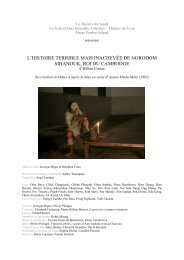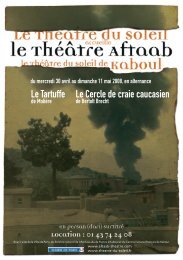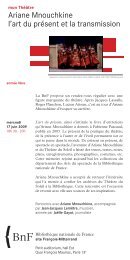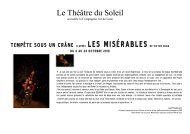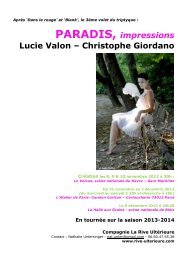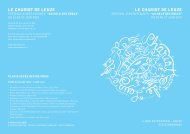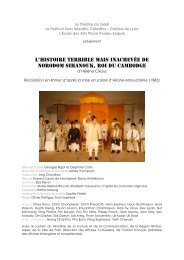la revue de presse - Le Théâtre du Soleil
la revue de presse - Le Théâtre du Soleil
la revue de presse - Le Théâtre du Soleil
You also want an ePaper? Increase the reach of your titles
YUMPU automatically turns print PDFs into web optimized ePapers that Google loves.
théâtre <strong>du</strong> soleil in afghanistanMy goal in choosing the theme for theworkshop was to go as far as I could go withoutrocking the situation. As I said, I didn’tknow everybody who was there. I knew thegroup of fifty, the people who really wanted todo theater. But sitting behind were other people,and I didn’t know what they were thinking.That’s why I didn’t want something tosud<strong>de</strong>nly happen which would hin<strong>de</strong>r everyone,and which would stop this flowering libertythat we discovered in the workshop. I didnot push. As we say in France, je ne vou<strong>la</strong>is paspoussez le bouchons trop loin — I did not wantto push the cork too far. If we do a scene onarranged marriage in Afghanistan, that meanswe have to talk about somebody who is verynear us. And we have to talk about an everydayhappening in Afghanistan. But distance isalso a great tool in theater, and I think theyun<strong>de</strong>rstood perfectly well the cruelty — yes,the cruelty — of this act, from watching aMolière scene about an arranged marriage inseventeenth-century Italy.We <strong>de</strong>alt with comedy as well. Thatwas my second goal: mask and comedy. If wewant to <strong>de</strong>al with forced marriages in Afghanistantoday, that’s tragedy, not comedy, so it’sanother form. Maybe if there is another workshop,and people are working there for a longertime, they can <strong>de</strong>al directly with tragedy. ButI wanted to <strong>de</strong>al with comedy, because I thinkthat comedy has a revolutionary strength, andbecause I thought — mistakenly — that theydidn’t <strong>la</strong>ugh a lot. They worked on Molièrewithout exactly knowing they were workingon Molière. And I discovered that they canreally <strong>la</strong>ugh!In response to questions I have heardabout whether theater is received or con<strong>de</strong>mnedas a Western form in Afghanistan,I must say that I don’t think the word Westernizedis a good one because they have manyEastern Greek Orthodox theaters. And theEast has beautiful theaters, too: India hasmany very beautiful theaters, and Indonesiahas beautiful theater, and other Is<strong>la</strong>mic countriestoo. Theater is not Western. Art is notWestern. I don’t even know what Westerninfluence is. It <strong>de</strong>pends on what people aretold, of course; if somebody comes to a vil<strong>la</strong>geand says, “This is Shi‘ite, this is Western,”then the perception doesn’t come frominstinct, it comes from propaganda.The struggle against art does not comefrom the soul; it comes from the brainwashing,from fascism. I think theater is in our genes,so of course it’s dangerous. It’s dangerous. Soeither they try, fascists try to <strong>de</strong>stroy it, or theytry and manipu<strong>la</strong>te it, because they know it’sa very, very powerful weapon in a way. It’s acivilization weapon. It’s incarnation. It’s flesh,it’s thinking flesh, so it mustn’t rival anotherpower.kluyver I have some experience with thistoo. First, as a general remark, I will say thattheater is a medium — theater in itself is notWestern or Eastern. We have actually showntheater in more than seven hundred differentp<strong>la</strong>ces in Afghanistan to date. We haveorganized theater, mobile theater campaigns,which re<strong>la</strong>ted to elections, but with a freekind of interpretation: not really <strong>de</strong>liveringmessages, but offering a general i<strong>de</strong>a of whyelections are important, of what kind of personyou should try to elect. Since Afghanistanhas a lot of regional cultural differences, weuse local groups to tour in their own regionsinstead of sending a group from Kabul, sincethe groups in Kabul are afraid of going to theother provinces. Local groups already knowhow far they can go, and what they can do.So this helps bridge differences from regionto region, for example, and especially with theissue of women: In some regions they won’thave women actresses perform, but they’ll havemale actors dress up and perform the roles ofwomen. In other regions even that is not done.In the north when we ask them to put in onewoman, they put in two women because theywould like to have more women perform, soit <strong>de</strong>pends a little bit on the region. But it’s75



